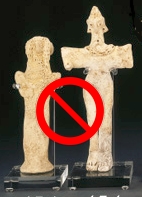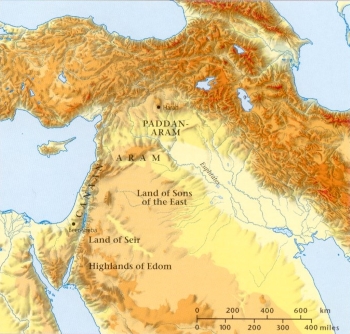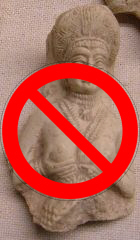To•lᵊd•otꞋ 6th Eve
Ri•vᵊq•âh's Despondency Over Ei•sauꞋ's Intermarriage

 |
| Two Hittite terracotta |
 |
After SârꞋâh expelled the Egyptian idolatress, Hâ•gârꞋ, from the family, Ri•vᵊq•âh knew that Yi•tzᵊkhâqꞋ would not consider another idolatrous woman for marriage to his son, Ya•a•qovꞋ. A priori, the only alternative to the idolatrous local Hittite women would be their relatives—in the house of her father, Bᵊt•u•eilꞋ, in Khâ•rânꞋ, Pa•danꞋ A•râmꞋ.
So, following the tradition that SârꞋâh had set rejecting the foreign idolatress, Hâ•gârꞋ, from the family, Ri•vᵊq•âh confided to Yi•tzᵊkhâqꞋ, "I feel a sickening-despondency1 at how my life is turning out because Ei•sauꞋ is married to those idolatrous bat-Hittite women. Now, if Ya•a•qovꞋ marries a bat-Hittite too, life just won't be worth living anymore."
Spurred By The Despondency Of His Wife, Ri•vᵊq•âh
Yi•tzᵊkhâqꞋ Blesses Ya•a•qovꞋ To Find A Religiously-Compatible Wife
 |
Then Yi•tzᵊkhâqꞋ called Ya•a•qovꞋ and blessed him again; this time with the following blessing for a safe and successful round-trip to Khâ•rânꞋ to marry a religiously compatible wife from the house of his father-in-law and cousin, Bᵊt•u•eilꞋ:
"Don't take a Bat-Kᵊna•anꞋ as your woman!" Yi•tzᵊkhâqꞋ commanded him. "Outfit a caravan and go to Pa•danꞋ A•râmꞋ, to the house of your maternal grandfather, Bᵊt•u•eilꞋ; and choose a wife from among the daughters of his son, your uncle, Lâ•vânꞋ. So may Eil Shad•aiꞋ bless you, make you fruitful and numerous so you may become a convocation of clans. May He grant the blessing of Avᵊrâ•hâmꞋ to you and your descendents to possess the land in which you now reside, which Ël•oh•imꞋ gave to Avᵊrâ•hâmꞋ."
So Yi•tzᵊkhâqꞋ sent Ya•a•qovꞋ off, and he went to Pa•danꞋ A•râmꞋ, to the house of Lâ•vânꞋ Bën-Bᵊt•u•eilꞋ, the Aramaen and brother of Ri•vᵊq•âh, the mother of the twins, Ei•sauꞋ and Ya•a•qovꞋ.
Ei•sauꞋ Married a Daughter of Yi•shᵊm•â•eilꞋ
When Ei•sauꞋ saw that Yi•tzᵊkhâqꞋ had blessed Ya•a•qovꞋ and sent him to Pa•danꞋ A•râmꞋ to to take a wife from there, in conformance with the blessing, and he commanded him saying, "Don't take a Bat-Kᵊna•anꞋ as your woman!"; and that Ya•a•qovꞋ had hearkened to his father and mother, and went to Pa•danꞋ A•râmꞋ, then Ei•sauꞋ saw that, in the eyes of his father, Yi•tzᵊkhâqꞋ, the Bᵊn•ōt-Kᵊna•anꞋ were also wrong for Ei•sauꞋ.
So Ei•sauꞋ, simplistically ignoring the core reason that Yi•tzᵊkhâqꞋ and Ri•vᵊq•âh prohibited marriage to the Bᵊn•ōt-Kᵊna•anꞋ—their idolatry, went to his step-uncle by the Hâ•gârꞋ, the Egyptian idolatress, Yi•shᵊm•â•eilꞋ, and took Mâ•khal•atꞋ Bat-Yi•shᵊm•â•eilꞋ Bën- Avᵊrâ•hâmꞋ, over his wives, for a woman.

Optional parental preparation:
Note 1 – In the SeiphꞋër Tor•âhꞋ, the ÷ is deliberately written significantly smaller in the word ÷ÇöÀúÌÄé. This is to indicate a significant lessening (corruption or contamination) in '÷, which is the gi•maꞋtri•yâh for 100 (in this case, being a lessening by a factor of 100; i.e., 1/100th) as well as the standard abbreviation for ÷ÉãÆùÑ (see The Nᵊtzâr•imꞋ Reconstruction of Hebrew Ma•ti•tᵊyâhꞋu (NHM) note 13.23.1)—caused by Ei•sauꞋ's intermarriage to idolatrous Hittite women who worshiped idols (equating to Egyptian, Mesopotamian and later Canaanite idols), including a sun 112x204.jpg)
Hittite sun goddessgold amulet (ca. B.C.E. 1550-1200); approx. actual sizegod, stormgod, skygod, queengoddessof heaven equating to Egyptians'Isis, Akkadian-AssyrianInnana/Ishtar, Phoenicians'Astarte(both equivalent to modernEaster) and the Hellenist GreekAphrodite(morphed into Hellenist RomanVenus) along with a variety of other idols.
Questions you might anticipate that your child might raise and be prepared to discuss:
- What does despondency mean?
- What does a priori mean?
- What does compatible mean? What is religiously-compatible?
- What's a maternal grandfather?
- What's a father-in-law?
- What's a cousin?
- What's a brother-in-law?
Google+ registered author & publisher

